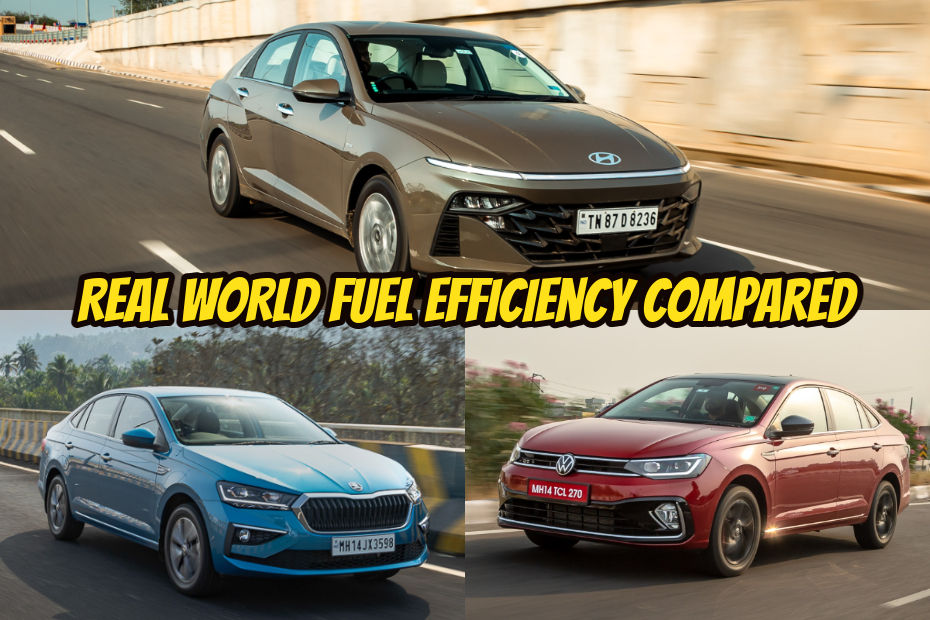Hyundai Verna Turbo DCT vs Skoda Slavia And Volkswagen Virtus 1.5 DSG: Real-world Fuel Efficiency Compared
Modified On May 08, 2023 11:07 AM By Shreyash
- Write a comment
Unlike the Verna, the Slavia and Virtus feature active cylinder deactivation technology for increased fuel efficiency. Can this help them win?

Hyundai has responded to the recent revival of the compact sedan segment in India with the launch of new-generation Verna. This time, the Verna is not only decked up with premium features, but it also packs a punch with the new 1.5-litre turbo petrol engine, taking the crown of the most powerful sedan away from the Volkswagen-Skoda duo of the Virtus and Slavia with the 1.5 litre TSI engine. All three models offer their most powerful engines with a 7-speed dual-clutch automatic. But, how well do they fare against each other in terms of fuel efficiency? In this article, we will answer this question based on our real-world test results:
| Hyundai Verna |
Volkswagen Virtus |
Skoda Slavia |
|
| Power |
160PS |
150PS |
150PS |
| Torque |
253Nm |
250Nm |
250Nm |
| Transmission |
7-speed DCT |
7-speed DSG |
7-speed DSG |
| Tested Highway Fuel Efficiency |
18.89kmpl |
18.87kmpl |
20.85kmpl |
| Tested City Fuel Efficiency |
12.60kmpl |
12.12kmpl |
14.14kmpl |

The Skoda Slavia beats both its rivals in city and highway driving conditions by around 2kmpl. Its advantage over the Hyundai Verna lowers to 1.5kmpl in city driving conditions.
Also Read: New-Gen Skoda Superb & Kodiaq Teased Along With 4 All-New EVs

With their 1.5-litre TSI engines, both Virtus and Slavia offer active cylinder deactivation technology, which maximises fuel economy by shutting off the two cylinders under low stress situations. Given they have the same powertrains, the Virtus’ lower economy is quite surprising, but is down to the tune of the power delivery of the engine.
Also Check Out: Volkswagen To Add A Manual Option For The Virtus GT

On the other hand, the new-gen Hyundai Verna, which is the most powerful compact sedan in its segment without cylinder deactivation, has almost similar fuel economy as the Virtus in highway driving conditions. When it comes to city driving, the Verna is still nearly 0.5kmpl more efficient than the Virtus.
Based on our test results, we estimate the fuel economy of the compact sedans in mixed conditions below:
| Model |
City:Highway (50:50) |
City:Highway (25:75) |
City:Highway (75:25) |
| Hyundai Verna |
15.11kmpl |
16.79kmpl |
13.74kmpl |
| Volkswagen Virtus |
14.75kmpl |
16.56kmpl |
13.31kmpl |
| Skoda Slavia |
16.85kmpl |
18.63kmpl |
15.37kmpl |

Skoda Slavia has the best mileage figures in mixed driving conditions by offering over 2kmpl more than the Virtus and over 1.5kmpl more than the Verna in each condition. The Verna and Virtus have almost similar mileage figures in mixed driving conditions, with a difference of up to 0.43kmpl.
To sum it up, the Slavia is the most fuel efficient compact sedan while the Hyundai Verna and Volkswagen Virtus will deliver similar levels of efficiency. However, these mileage figures may vary depending on the driving style, road condition and vehicle health. If you have any of these sedans, do share your fuel economy experience in the comments below. And if you are interested in knowing which one of these is the quickest, our sister publication ZigWheels has the hot story ready.
Read More on : Verna on road price
5 out of 5 found this helpful















